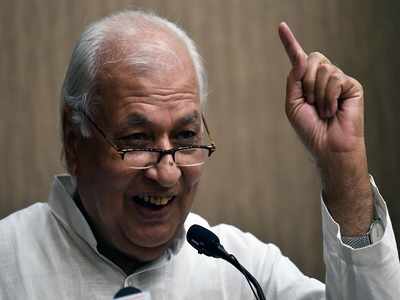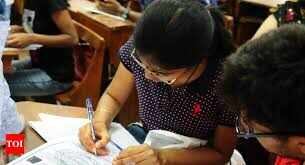
President Ram Nath Kovind on Sunday appointed five governors. Of them, four were senior BJP leaders - Bhagat Singh Koshyari, Tamilisai Soundararajan, Bandaru Dattatreya and Kalraj Mishra. They have been sent to Maharashtra, Telangana, Himachal Pradesh and Rajasthan respectively. Former Union minister Arif Mohammed Khan, who was sent to Kerala, is the only Muslim and non-BJP member among the five to get the gubernatorial assignment.
Khan was a minister of state for home in the Rajiv Gandhi government. However, he resigned in 1986 after the Congress government decided to overturn the Supreme Court judgment in the Shah Bano case which upheld her right to alimony from her husband.
Recently, he supported the Supreme Court order of 2017 and Narendra Modi government’s move in July to ban instant triple talaq.
There are contrasting views about Khan being appointed as Kerala governor.
Talking to timesofindia.com, former Union minister spokesperson and BJP spokesperson Shahnawaz Hussain said his party has always promoted “nationalist and progressive” leaders, including Muslims. “The BJP has always liked progresive people who are filled with nationalist feelings,” he said.
However, former Congress leader Shakeel Ahmad has a different opinion about Khan’s appointment. “The day Khan stood up against the Rajiv Gandhi government over the Shah Bano case, he was cut off from his own community. Though he claimed to be a secular person, he hurt the sentiments of his own community. I do not think it is fair to call him a progressive Muslim,” he said.
Shakeel Ahmad eulogised some of the qualities of Arif Mohammed Khan. “In my opinion, he [Khan] is articulate, cultured, civilised and a well-read person. But in a nut-shell we can say that he is a spoiled genius for his own community,” he said.
Though Ahmad may disagree over Khan, there are other Muslim leaders whom the BJP has promoted. Shahnawaz Hussain calls them “nationalist and progressive personalities”.
Mukhtar Abbas Naqvi
Minorities affairs minister in the Narendra Modi cabinet, Mukhtar Abbas Naqvi was jailed during the Emergency. He was the national vice-president of the BJP’s youth wing Bharatiya Janata Yuva Morcha (BJYM) from 1992 to 1997. He was elected to the Lok Sabha in 1998 and was minister of state for information and broadcasting in the Atal Bihari Vajpayee government.
He has served on the posts of secretary, general secretary, vice-president and spokesperson of the BJP in all these years.He is a strong proponent of the BJP’s ideology.
Syed Shahnawaz Hussain
BJP national spokesperson Syed Shahnawaz Hussain is associated with the party for a long time. He is a member of the BJP’s coveted central election committee. He was elected to the 13th Lok Sabha in 1999 and was minister of state in the Vajpayee government.
When he was elevated to the rank of a cabinet minister in the civil aviation ministry in September 2001, he became one of the youngest cabinet ministers ever at the Centre.
Shahnawaz Hussain, a moderate, is known to be one of the most popular Muslim faces in the BJP. He defends the party and propagates its ideology at different forums.
Farooq Khan
Lakshadweep administrator Farooq Khan was appointed as the chief security advisor to Jammu and Kashmir governor Satya Pal Malik on July 13. He is a former IPS officer and Inspector General of Police in Jammu and Kashmir, having played a major role in anti-terrorism operations in the state.
Hailing from Jammu, Farooq Khan retired from government service in 2013 and joined the BJP next year before the Lok Sabha election. He was made in-charge of BJP Minority Morcha and BJP's affairs in Nagaland. He was also the party’s spokesperson in Jammu and Kashmir.
Farooq Khan’s grandfather, Colonel Peer Mohammad, was the first state president of Jana Sangh’s Jammu and Kashmir unit.
APJ Abdul Kalam
Becoming India’s 11th president on July 25, 2002 during the Vajpayee government, Avul Pakir Jainulabdeen Abdul Kalam, popularly known as APJ Abdul Kalam, was the first non-politician to sit on the coveted chair. Because of his humility and simplicity, he was also known as the “People’s President”.
Born on October 15, 1931 at Rameswaram in Tamil Nadu, Abdul Kalam specialised in Aeronautical Engineering from Madras Institute of Technology. He made significant contribution in the development of India's first indigenous Satellite Launch Vehicle (SLV-III) and was responsible for the evolution of ISRO's launch vehicle programme, particularly the PSLV configuration. He is credited with the development of AGNI and PRITHVI missiles, which earned him the epithet of “Missile Man”.
He was at the forefront of the Pokhran-II nuclear tests on May 11, 1998. He served as the principal scientific advisor to the central government and was responsible for evolving policies, strategies and missions for many development applications.
Apart from these, Kalam ignited the young minds for national development by meeting high school students across the country. His focus was on transforming India into a developed nation by 2020.
Kalam also authored popular books such as "Wings of Fire", "India 2020 - A Vision for the New Millennium", "My journey" and "Ignited Minds - Unleashing the power within India".
He was awarded Padma Bhushan in 1981, Padma Vibhushan in 1990 and the highest civilian award Bharat Ratna in 1997.
Najma Heptulla
Manipur governor Najma Heptulla was in the Congress for a long time. She joined the BJP before the 2004 Lok Sabha election accusing Congress president Sonia Gandhi of humiliating her. The BJP fielded her for the post of vice-president of India against Congress’s Hamid Ansari in 2007 but she lost the election.
Najma Heptulla has the unique distinction of being elected as deputy chairperson of Rajya Sabha four times - from January 1985 till April 2004 and being on the post for the longest period of about 17 years.
She was BJP vice-president in 2010 when Nitin Gadkari was party president. She served as the minority affairs minister in Modi's cabinet from May 26, 2014 till July 12, 2016. After attaining the age of 75 years, the age till which someone holds a ministerial portfolio or a BJP post, she was made the Manipur governor.
Sikandar Bakht
Sikandar Bakht was imprisoned in the Rohtak jail during Emergency which was imposed on June 25, 1975. He won the 1977 Lok Sabha election as a Janata Party candidate from Chandni Chowk in Delhi. He served as a cabinet minister in the Morarji Desai government.
He joined the BJP when the Janata Party split in 1980 and was appointed as the party’s general secretary. He was the foreign affairs minister in the 13-day Vajpayee government in May 1996.
In 1998, Sikandar Bakht became the industries minister besides holding the post of the leader of the house in Rajya Sabha till 2002 when he retired from active politics.
He was appointed as the Kerala governor in 2002 and died in harness on February 23, 2004.
Arif Beg
Along with Sikandar Bakht, Arif Baig was one of the oldest Muslim leaders of the BJP. Hailing from Madhya Pradesh, he too was a Union minister in the Morarji Desai government between 1977 and 1980.
Beg had won the 1977 Lok Sabha election from Bhopal on Bharatiya Lok Dal ticket. He was elected in 1989 to the Lok Sabha from Betul constituency on BJP ticket.
However, he quit the BJP in 1996 only to return to the party fold in 2003. He died in Bhopal on September 5, 2015. He was 81.
Khan was a minister of state for home in the Rajiv Gandhi government. However, he resigned in 1986 after the Congress government decided to overturn the Supreme Court judgment in the Shah Bano case which upheld her right to alimony from her husband.
Recently, he supported the Supreme Court order of 2017 and Narendra Modi government’s move in July to ban instant triple talaq.
There are contrasting views about Khan being appointed as Kerala governor.
Talking to timesofindia.com, former Union minister spokesperson and BJP spokesperson Shahnawaz Hussain said his party has always promoted “nationalist and progressive” leaders, including Muslims. “The BJP has always liked progresive people who are filled with nationalist feelings,” he said.
However, former Congress leader Shakeel Ahmad has a different opinion about Khan’s appointment. “The day Khan stood up against the Rajiv Gandhi government over the Shah Bano case, he was cut off from his own community. Though he claimed to be a secular person, he hurt the sentiments of his own community. I do not think it is fair to call him a progressive Muslim,” he said.
Shakeel Ahmad eulogised some of the qualities of Arif Mohammed Khan. “In my opinion, he [Khan] is articulate, cultured, civilised and a well-read person. But in a nut-shell we can say that he is a spoiled genius for his own community,” he said.
Though Ahmad may disagree over Khan, there are other Muslim leaders whom the BJP has promoted. Shahnawaz Hussain calls them “nationalist and progressive personalities”.
Mukhtar Abbas Naqvi
Minorities affairs minister in the Narendra Modi cabinet, Mukhtar Abbas Naqvi was jailed during the Emergency. He was the national vice-president of the BJP’s youth wing Bharatiya Janata Yuva Morcha (BJYM) from 1992 to 1997. He was elected to the Lok Sabha in 1998 and was minister of state for information and broadcasting in the Atal Bihari Vajpayee government.
He has served on the posts of secretary, general secretary, vice-president and spokesperson of the BJP in all these years.He is a strong proponent of the BJP’s ideology.
Syed Shahnawaz Hussain
BJP national spokesperson Syed Shahnawaz Hussain is associated with the party for a long time. He is a member of the BJP’s coveted central election committee. He was elected to the 13th Lok Sabha in 1999 and was minister of state in the Vajpayee government.
When he was elevated to the rank of a cabinet minister in the civil aviation ministry in September 2001, he became one of the youngest cabinet ministers ever at the Centre.
Shahnawaz Hussain, a moderate, is known to be one of the most popular Muslim faces in the BJP. He defends the party and propagates its ideology at different forums.
Farooq Khan
Lakshadweep administrator Farooq Khan was appointed as the chief security advisor to Jammu and Kashmir governor Satya Pal Malik on July 13. He is a former IPS officer and Inspector General of Police in Jammu and Kashmir, having played a major role in anti-terrorism operations in the state.
Hailing from Jammu, Farooq Khan retired from government service in 2013 and joined the BJP next year before the Lok Sabha election. He was made in-charge of BJP Minority Morcha and BJP's affairs in Nagaland. He was also the party’s spokesperson in Jammu and Kashmir.
Farooq Khan’s grandfather, Colonel Peer Mohammad, was the first state president of Jana Sangh’s Jammu and Kashmir unit.
APJ Abdul Kalam
Becoming India’s 11th president on July 25, 2002 during the Vajpayee government, Avul Pakir Jainulabdeen Abdul Kalam, popularly known as APJ Abdul Kalam, was the first non-politician to sit on the coveted chair. Because of his humility and simplicity, he was also known as the “People’s President”.
Born on October 15, 1931 at Rameswaram in Tamil Nadu, Abdul Kalam specialised in Aeronautical Engineering from Madras Institute of Technology. He made significant contribution in the development of India's first indigenous Satellite Launch Vehicle (SLV-III) and was responsible for the evolution of ISRO's launch vehicle programme, particularly the PSLV configuration. He is credited with the development of AGNI and PRITHVI missiles, which earned him the epithet of “Missile Man”.
He was at the forefront of the Pokhran-II nuclear tests on May 11, 1998. He served as the principal scientific advisor to the central government and was responsible for evolving policies, strategies and missions for many development applications.
Apart from these, Kalam ignited the young minds for national development by meeting high school students across the country. His focus was on transforming India into a developed nation by 2020.
Kalam also authored popular books such as "Wings of Fire", "India 2020 - A Vision for the New Millennium", "My journey" and "Ignited Minds - Unleashing the power within India".
He was awarded Padma Bhushan in 1981, Padma Vibhushan in 1990 and the highest civilian award Bharat Ratna in 1997.
Najma Heptulla
Manipur governor Najma Heptulla was in the Congress for a long time. She joined the BJP before the 2004 Lok Sabha election accusing Congress president Sonia Gandhi of humiliating her. The BJP fielded her for the post of vice-president of India against Congress’s Hamid Ansari in 2007 but she lost the election.
Najma Heptulla has the unique distinction of being elected as deputy chairperson of Rajya Sabha four times - from January 1985 till April 2004 and being on the post for the longest period of about 17 years.
She was BJP vice-president in 2010 when Nitin Gadkari was party president. She served as the minority affairs minister in Modi's cabinet from May 26, 2014 till July 12, 2016. After attaining the age of 75 years, the age till which someone holds a ministerial portfolio or a BJP post, she was made the Manipur governor.
Sikandar Bakht
Sikandar Bakht was imprisoned in the Rohtak jail during Emergency which was imposed on June 25, 1975. He won the 1977 Lok Sabha election as a Janata Party candidate from Chandni Chowk in Delhi. He served as a cabinet minister in the Morarji Desai government.
He joined the BJP when the Janata Party split in 1980 and was appointed as the party’s general secretary. He was the foreign affairs minister in the 13-day Vajpayee government in May 1996.
In 1998, Sikandar Bakht became the industries minister besides holding the post of the leader of the house in Rajya Sabha till 2002 when he retired from active politics.
He was appointed as the Kerala governor in 2002 and died in harness on February 23, 2004.
Arif Beg
Along with Sikandar Bakht, Arif Baig was one of the oldest Muslim leaders of the BJP. Hailing from Madhya Pradesh, he too was a Union minister in the Morarji Desai government between 1977 and 1980.
Beg had won the 1977 Lok Sabha election from Bhopal on Bharatiya Lok Dal ticket. He was elected in 1989 to the Lok Sabha from Betul constituency on BJP ticket.
However, he quit the BJP in 1996 only to return to the party fold in 2003. He died in Bhopal on September 5, 2015. He was 81.
more from times of india news
Trending Topics
LATEST VIDEOS
Trending Videos
 Ganesh Chaturthi celebrations at Bharti Singh and Kanchi Singh's home
Ganesh Chaturthi celebrations at Bharti Singh and Kanchi Singh's home  Pakistani Sapna Choudhary, Mehak Malik is the new internet sensation!
Pakistani Sapna Choudhary, Mehak Malik is the new internet sensation!  Kerala’s first transwoman journalist 22-year-old Heidi Saadiya makes her debut with Chandrayaan-2 reportage
Kerala’s first transwoman journalist 22-year-old Heidi Saadiya makes her debut with Chandrayaan-2 reportage  Harsh Vardhan opts for cycle as mode of transportation to attend 72nd session of WHO SEARO
Harsh Vardhan opts for cycle as mode of transportation to attend 72nd session of WHO SEARO
More from TOI
Navbharat Times
Featured Today in Travel
Quick Links
Article 370RTI BillPodcast newsYamuna FloodG7 SummitMaharashtra election 2019West Bengal ElectionTamil Nadu election 2019UP Election 2019Bihar election 2019UP Election DateAndhra Election DateBihar Election DateAndhra Assembly ElectionLok SabhaMP Election DateMaharashtra Election DateShiv SenaYSRCPTDPWB Election DateJDUCongressBJP newsGujarat Election DateSC ST ActUIDAIIndian ArmyISRO newsSupreme CourtRajasthan Election DateTelangana Election DateTamilrockers 2018Uttarakhand newsSikkim newsOrrisa newsKarnataka Election DateNagaland newsSatta KingManipur newsMeghalaya news
Get the app





